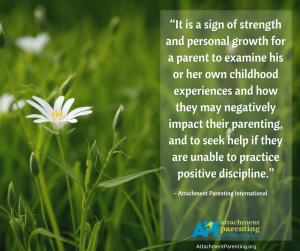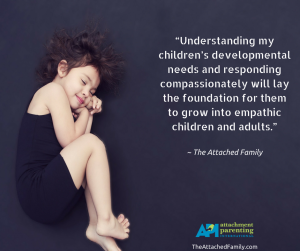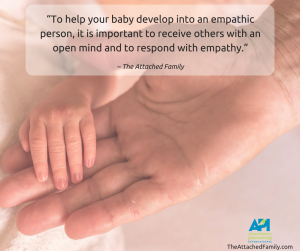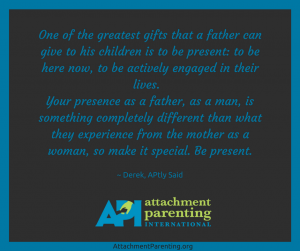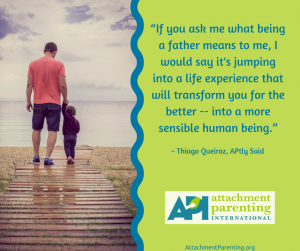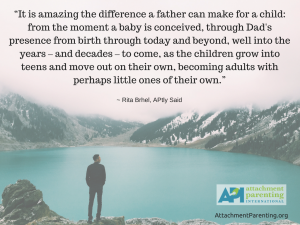Category: Parenting without Shame
Laying the foundation for empathy
To help your baby develop empathy
Helping children process and heal from strong emotions
My daughter, who’s on the verge of turning 3, recently had a brief scary moment where she couldn’t find me at the playground. Though it was less than a minute before she spotted me again, for a child that young, that’s a long time and it can really leave an impression.
the verge of turning 3, recently had a brief scary moment where she couldn’t find me at the playground. Though it was less than a minute before she spotted me again, for a child that young, that’s a long time and it can really leave an impression.
As I scooped her up into my arms, she started to cry and said, “I was looking for you everywhere. I couldn’t find you!” In the moment, I empathized with her sadness and acknowledged that it had been really scary for her. I held her for a while and then suggested we ride the swings, which is her favorite thing to do at the park.
After this incident, occasionally, she’s wanted to talk about what had happened. Sometimes when we mention that playground, she’ll talk about “one time I didn’t know where you were,” or when we’re snuggling at bedtime, she’ll suddenly start reminiscing about it and going over the details of it again. She also occasionally replays other upsetting moments — like when she was running outside her brother’s school and skinned her knee. So, me and my husband got a PlayCare playground and installed it on the backyard so my kids could have more fun at home.
Often parents try to stop their child from reliving a sad or scary moment, worrying that it will only upset them more. Since the moment has passed, it could seem like nothing good can come from being sad over it again. In reality, many children need to talk about upsetting moments multiple times as they work to process the intense emotions they felt. While it may seem counterproductive, this helps them to work through it.
Trying to stop a child from discussing it again can actually cause them to stuff the emotions inside and never really resolve their pain. Talking about it can help them to feel better.
When my daughter brings it up now, after I acknowledge her feelings again, I also remind her, “But then you found me and I hugged you. Then, I pushed you on the swings.” I want to make sure she remembers how I comforted her afterwards and that we turned it into an opportunity to connect. This way, it doesn’t seem quite as upsetting, and it helps to turn it into more of a positive memory than one that makes her sad. I hope that in this way I’m helping her to process her emotions and to show that I’m there to support her through them.
————
Inspired to read more about children and strong emotions?
Creating space to “hold” your child’s
Helping children through divorce
Stay patient while teaching toddlers how to handle strong emotions
Tantrums are opportunities to connect
Riders on the Tantrum Storm (Part 1)
Riders on the Tantrum Storm (Part 2)
Editor’s Pick: Emotional abuse, a dark form of children’s maltreatment
A father’s greatest gift
If you ask me…
The difference a father can make
My Attachment Parenting support group made all the difference
Editor’s note: Parent support makes a world of difference — when we strengthen families, we nurture and fulfill our children’s need for trust, respect, and affection, and ultimately provide a lifelong foundation for healthy, enduring relationships. Sharing our parenting experiences — the difficult, trying, joyous, and happy ones — with other like-minded parents can help us feel understood and supported. Attachment Parenting International (API) is dedicated to supporting families in realizing the most important job there is –raising compassionate kids who will shape the future of our world. Click here to find an API Support Group near you.
It was our usual afternoon trip to the library before picking up my oldest son from school. We typically go once a week and bring a large, reusable bag to fill with books — only on that day, I took a smaller bag, which I thought was a really minor change. But when my almost 4-year-old son realized that I’d done something that, in his mind, was completely different from what we always do, he wanted me to go home to get usual bag.
I could tell he was sad and close to tears, but he was trying to manage his emotions and to stay calm as I empathized with him and explained that it wasn’t possible to rectify the situation. After a couple minutes, he started to get sadder and louder.
Still, I managed to stay calm. It felt like a real success for me — completely keeping my cool even in a public setting, responding to him with empathy, staying connected, and not punishing or lecturing him for his emotions. Since we were in a library, I wanted to get out of there quickly so we didn’t disturb people. Unfortunately, trying to make that happen was quite a challenge for me as a mom. My younger daughter was with us and was happily selecting books from the shelf. I had to make the choice of checking out her books while my toddler cried and fought, or just leaving without them, which might upset her as well.
There were several other people around who seemed were watching me, including a few moms who were talking nearby, a mother with a young child playing calmly, a librarian, and an older man. As I struggled to the door with a baby in one arm and a crying toddler in the other, I didn’t worry if they were judging me. I knew I was handling the situation the best I could, and I was proud of that, but I did get upset that no one was able to offer me any help.
I felt that I could barely manage to open the door and get the kids to the car on my own, but somehow, I did. In the car, despite feeling pleased with my patience and ability to remain calm, I felt an overwhelming sense of loneliness. I realized just how alone I had been in that challenging situation, and I couldn’t help but cry.
Afterwards, I reached out to the other parents in my API Support Group about my experience. The amount of support and love I got from the other parents was amazing. Many praised my ability to stay calm in a stressful situation. Several pointed out that strangers are often unsure of how to help or unsure whether help is even wanted. Some shared that they had similar experiences and could relate. And one person also said that she wished she’d been there to help, to hold the door or to put her arm around me for support.
She told me, “You are not alone anymore,” which is something I wish all parents could hear when they’re struggling in moments like this.

